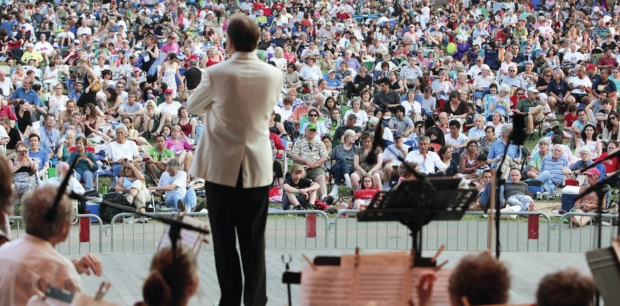
In its 25th year of free summer concerts, the Boston Landmarks Orchestra has maintained its mission to reflect and unite the many communities of Boston through orchestral music.
“The orchestra was started by Charles Ansbacher, who died in his 10th year as music director. So, I took over 15 years ago,” said Christopher Wilkins in an interview, the Landmarks Orchestra’s current conductor and musical director. “Charles was very interested in public policy and what the arts could do to make our civic spaces more beautiful, more livable, more connected.”
Ansbacher saw a gap he could fill in Boston’s lack of summer orchestral programs, both bringing music to the public as well as providing employment for musicians during the slower season.
“So, he started the orchestra and called it the Boston Landmarks Orchestra, with the idea that the orchestra would move around the city to landmark locations,” Wilkins said. “The idea was that the orchestra should be mobile and moving into neighborhoods, and not just places of historic interest, but also underserved neighborhoods.
That's really how the orchestra started, and its mission has never really changed, but we have changed a lot our methods.”
These
days, the Landmarks Orchestra calls the Hatch Memorial Shell home,
because the orchestra found it difficult to build an audience from
scratch each time it moved around the city. Instead, the orchestra now
reaches out to underserved communities with educational programming and
events like its Juneteenth concert or July 13 kickoff party, to bring
music lovers from around the city back to its central location at the
Shell.
This summer's series of free concerts will take place most Wednesday nights at 7pm from July 16 through August 27.
You
can get an early sample by attending the third annual Juneteenth
concert at 3pm on Saturday at The Salvation Army Ray and Joan Kroc Corps
Community Center.
In
its third year of Juneteenth performances, Wilkins said the concert is
inspired by the connection between the emancipation, the American
Revolution, the French Revolution and the Haitian Revolution. The
performance will feature Val Jeanty, a Haitian composer and professor at
Berklee College of Music.
“If
you ask people about American culture in the world, probably one of the
first things they're going to mention is all the great music that
America has contributed,” Wilkins said in an interview. “It's because of
our diversity. It's because of the influence of syncopation that came
particularly from the influence of the Congo in New Orleans, the blues
notes that came from the Senegambian region of Africa, the influence of
Spanish rhythms and Spanish dance. It’s this incredible confluence of
culture.”
This
summer’s program reflects that philosophy and is designed to get the
whole family involved. At any of the numerous free summer shows, kids
can participate in the “maestro zone,” where they can wave their own
batons along to the music to their heart’s content, but also learn a bit
about conducting from an assistant conductor.
“It
is as open and accessible as a concert can possibly be. You can bring
food, you can bring a blanket, you can bring your dog,” Wilkins said.
“One of my favorite things is walking out into the crowd at
intermission, because they’re right there. I can walk from the stage
straight out into the crowd and see people loving being with their
family, with their kids and with their neighbors. The sun is going down
over the river, there’s sail boats on the Charles, the stars begin to
come out, the moon rises over the Shell. There’s nothing like it. It’s
those kinds of nights people remember.”